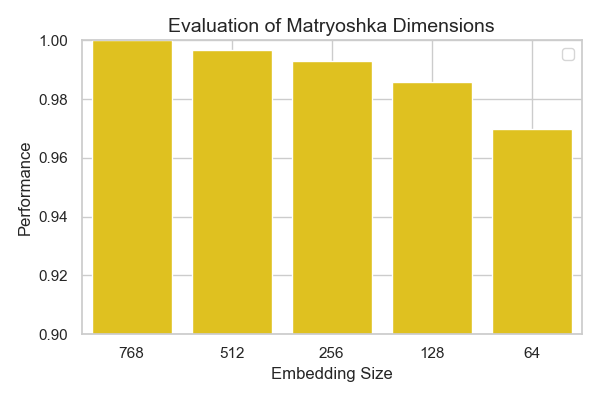tags:
- sentence-transformers
- sentence-similarity
- feature-extraction
- generated_from_trainer
- loss:MatryoshkaLoss
- loss:MultipleNegativesRankingLoss
- mteb
base_model: aubmindlab/bert-base-arabertv02
pipeline_tag: sentence-similarity
library_name: sentence-transformers
metrics:
- pearson_cosine
- spearman_cosine
- pearson_manhattan
- spearman_manhattan
- pearson_euclidean
- spearman_euclidean
- pearson_dot
- spearman_dot
- pearson_max
- spearman_max
model-index:
- name: omarelshehy/Arabic-STS-Matryoshka-V2
results:
- dataset:
config: ar-ar
name: MTEB STS17 (ar-ar)
revision: faeb762787bd10488a50c8b5be4a3b82e411949c
split: test
type: mteb/sts17-crosslingual-sts
metrics:
- type: pearson
value: 85.1977
- type: spearman
value: 86.0559
- type: cosine_pearson
value: 85.1977
- type: cosine_spearman
value: 86.0559
- type: manhattan_pearson
value: 83.01950000000001
- type: manhattan_spearman
value: 85.28620000000001
- type: euclidean_pearson
value: 83.1524
- type: euclidean_spearman
value: 85.3787
- type: main_score
value: 86.0559
task:
type: STS
- dataset:
config: en-ar
name: MTEB STS17 (en-ar)
revision: faeb762787bd10488a50c8b5be4a3b82e411949c
split: test
type: mteb/sts17-crosslingual-sts
metrics:
- type: pearson
value: 16.234
- type: spearman
value: 13.337499999999999
- type: cosine_pearson
value: 16.234
- type: cosine_spearman
value: 13.337499999999999
- type: manhattan_pearson
value: 11.103200000000001
- type: manhattan_spearman
value: 8.8513
- type: euclidean_pearson
value: 10.7335
- type: euclidean_spearman
value: 7.857
- type: main_score
value: 13.337499999999999
task:
type: STS
- dataset:
config: ar
name: MTEB STS22 (ar)
revision: de9d86b3b84231dc21f76c7b7af1f28e2f57f6e3
split: test
type: mteb/sts22-crosslingual-sts
metrics:
- type: pearson
value: 49.8116
- type: spearman
value: 58.7217
- type: cosine_pearson
value: 49.8116
- type: cosine_spearman
value: 58.7217
- type: manhattan_pearson
value: 55.281499999999994
- type: manhattan_spearman
value: 58.658
- type: euclidean_pearson
value: 54.600300000000004
- type: euclidean_spearman
value: 58.59029999999999
- type: main_score
value: 58.7217
task:
type: STS
SentenceTransformer based on aubmindlab/bert-base-arabertv02
🚀 🚀 This is Arabic only sentence-transformers model finetuned from aubmindlab/bert-base-arabertv02. It maps sentences & paragraphs to a 768-dimensional dense vector space and can be used for semantic textual similarity, semantic search, clustering, and more.
Matryoshka Embeddings 🪆
This model supports Matryoshka embeddings, allowing you to truncate embeddings into smaller sizes to optimize performance and memory usage, based on your task requirements. Available truncation sizes include: 768, 512, 256, 128, and 64
You can select the appropriate embedding size for your use case, ensuring flexibility in resource management.
Model Details
Model Description
- Model Type: Sentence Transformer
- Base model: aubmindlab/bert-base-arabertv02
- Maximum Sequence Length: 512 tokens
- Output Dimensionality: 768 tokens
- Similarity Function: Cosine Similarity
Full Model Architecture
SentenceTransformer(
(0): Transformer({'max_seq_length': 512, 'do_lower_case': False}) with Transformer model: BertModel
(1): Pooling({'word_embedding_dimension': 768, 'pooling_mode_cls_token': False, 'pooling_mode_mean_tokens': True, 'pooling_mode_max_tokens': False, 'pooling_mode_mean_sqrt_len_tokens': False, 'pooling_mode_weightedmean_tokens': False, 'pooling_mode_lasttoken': False, 'include_prompt': True})
)
Usage
Direct Usage (Sentence Transformers)
First install the Sentence Transformers library:
pip install -U sentence-transformers
Then you can load this model and run inference.
from sentence_transformers import SentenceTransformer
# Download from the 🤗 Hub
model = SentenceTransformer("omarelshehy/Arabic-STS-Matryoshka-V2")
# Run inference
sentences = [
'أحب قراءة الكتب في أوقات فراغي.',
'أستمتع بقراءة القصص في المساء قبل النوم.',
'القراءة تعزز معرفتي وتفتح أمامي آفاق جديدة.',
]
embeddings = model.encode(sentences)
print(embeddings.shape)
# [3, 768]
# Get the similarity scores for the embeddings
similarities = model.similarity(embeddings, embeddings)
print(similarities.shape)
# [3, 3]
📊 Evaluation (Performance vs Embedding size)
I evaluated this model on the MTEB STS17 for arabic for different Embedding sizes 🪆
The results are plotted below:
as seen from the plot, only very small degradation of performance happens across smaller matryoshka embedding sizes.
Citation
BibTeX
Sentence Transformers
@inproceedings{reimers-2019-sentence-bert,
title = "Sentence-BERT: Sentence Embeddings using Siamese BERT-Networks",
author = "Reimers, Nils and Gurevych, Iryna",
booktitle = "Proceedings of the 2019 Conference on Empirical Methods in Natural Language Processing",
month = "11",
year = "2019",
publisher = "Association for Computational Linguistics",
url = "https://arxiv.org/abs/1908.10084",
}
MatryoshkaLoss
@misc{kusupati2024matryoshka,
title={Matryoshka Representation Learning},
author={Aditya Kusupati and Gantavya Bhatt and Aniket Rege and Matthew Wallingford and Aditya Sinha and Vivek Ramanujan and William Howard-Snyder and Kaifeng Chen and Sham Kakade and Prateek Jain and Ali Farhadi},
year={2024},
eprint={2205.13147},
archivePrefix={arXiv},
primaryClass={cs.LG}
}
MultipleNegativesRankingLoss
@misc{henderson2017efficient,
title={Efficient Natural Language Response Suggestion for Smart Reply},
author={Matthew Henderson and Rami Al-Rfou and Brian Strope and Yun-hsuan Sung and Laszlo Lukacs and Ruiqi Guo and Sanjiv Kumar and Balint Miklos and Ray Kurzweil},
year={2017},
eprint={1705.00652},
archivePrefix={arXiv},
primaryClass={cs.CL}
}
